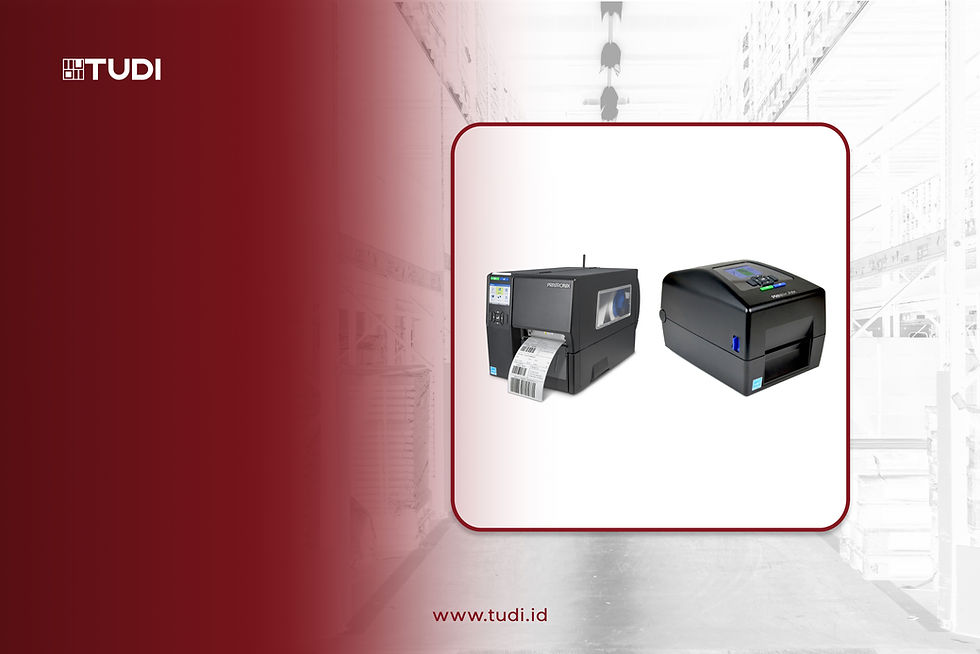RFID Printer: Definition, How it Works, Functions, Types, and Benefits
- Marketing Tudi
- Aug 19, 2025
- 3 min read
Updated: Aug 21, 2025

As technology advances RFID, the need for printing and data encoding processes becomes increasingly important. Many businesses require labels that are not only visually clear but also store unique digital data ready for asset tracking.
Without a device that combines these two processes, the risk of data errors and operational inefficiencies can increase. RFID printers offer a practical solution to these challenges.
Understanding RFID Printers
An RFID printer is a specialized device that simultaneously combines label printing and data writing to an RFID chip. This device can produce ready-to-use RFID labels, either visually using text, barcodes, or logos, or digitally using unique information stored on the chip. This technology enables faster, more accurate, and more efficient label production.
How RFID Printers Work
RFID printers work through two main stages in a single process flow. First, the printer prints visual information such as text, a logo, or a barcode onto the RFID label. Second, via an internal antenna, the printer sends a signal to write digital data to the RFID chip, such as a serial number or product code.
After the printing and writing process is complete, the printer will perform automatic verification to ensure the chip can be read correctly by the printer. RFID reader This step minimizes the risk of defective labels or incorrect data, thereby increasing the reliability of asset tracking.
RFID Printer Function
RFID printers play a crucial role in supporting RFID-based tracking systems across various business sectors. Their primary functions include printing ready-to-use RFID labels, writing digital data according to operational requirements, and verifying label quality before use. Furthermore, these devices help save label production time, reduce the risk of human error, and ensure optimal performance of each tag in the field.
For example, without an RFID printer, the label-making process typically involves manual printing on one device and then programming the chip separately on another. This method is time-consuming, prone to data entry errors, and makes it difficult to ensure label quality before use. With an RFID printer, both processes are automated in a single step, resulting in faster, more accurate label production, and immediate field-ready use.
RFID Printer Types
Based on the needs and scale of use, RFID printers are available in the following main types:
1. Desktop RFID Printer
Suitable for low- to medium-volume applications, such as in offices or retail stores. They are generally compact and easy to operate.
2. Industrial RFID Printer
Designed for high-volume work environments, such as warehouses, factories, or distribution centers, it offers high durability and advanced features to support 24/7 operations.
3. Mobile RFID Printer
Portable and used in the field, such as for stock checking or asset management directly on site.
Benefits of RFID Printers
The use of RFID printers provides a number of benefits that can increase the efficiency and accuracy of business operations, including:
1. Label Production Efficiency
Combines printing and data writing processes in one step, thus saving working time.
2. High Data Accuracy
Ensure that each chip contains the correct information and can be read properly by the RFID reader.
3. Increase Productivity
Accelerate the distribution of ready-to-use labels to various production or operational lines.
4. Consistent Quality
Automatic verification prevents the use of defective labels or incorrect data, maintaining tracking quality.
Conclusion
RFID printers are a crucial solution for businesses looking to integrate printing and data entry into a single, efficient device. This technology helps speed label production, reduces the risk of errors, and ensures high-quality asset tracking.
As a complete RFID solutions provider, TUDI offers a wide selection of RFID printers tailored to your operational needs. From small-scale printing to industrial applications, each device is powered by the latest technology to ensure optimal results.
Discuss your RFID needs with TUDI's team of experts and find the right solution to support your business's efficiency, accuracy, and growth.




